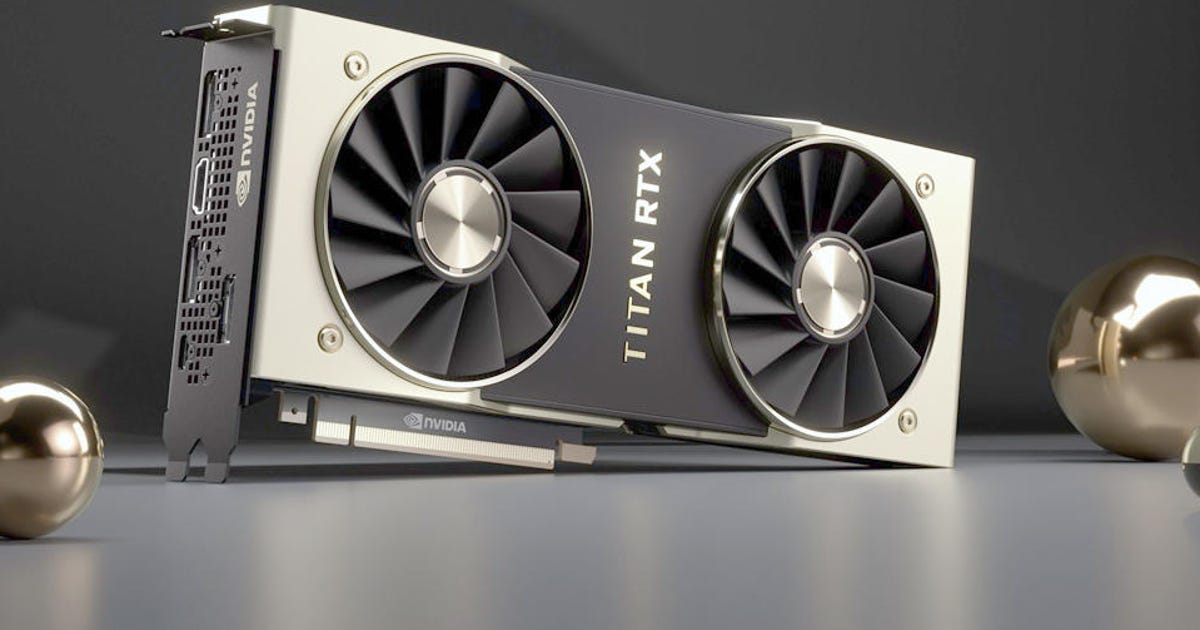
Nvidia's $2,500 Titan RTX is its most powerful prosumer GPU yet
Nvidia's Titan cards have always walked a fine line between the gamer-oriented GeForce and the professionally targeted Quadro. They're basically Quadro-power cards with GeForce-capability drivers. That historically plops them into the really, really expensive gaming GPU category or on the lists of video professionals who demand speed and value more than certification.
The new $2,499 Titan RTX, a Turing-architecture-based card that Nvidia announced Monday, adds even more of that power to the mix. It should still appeal to gamers, especially those who want to play Metro Exodus in 8K when it arrives in 2019. But the architecture's optimized ray-tracing and AI-acceleration cores also make it an option for more dataset-focused research, AI and machine-learning development and real-time 3D professional work that doesn't require workstation-class drivers.
The distinction between the GeForce and Quadro cards is waning over time as applications drift away from OpenGL. Adobe's video applications such as Premiere and After Effects, for example, use the CUDA cores directly for acceleration. But Photoshop is still the elephant in that room. You can still only get 30-bit color support (10 bits per channel) with the workstation drivers, which are restricted to Quadro cards.
It's hard to make direct comparisons solely based on specs, in part because Nvidia is inconsistent about the specs it provides at launch. You usually have to wait a little bit until people dig in and ferret them out.
Most of the specs Nvidia's provided for the $6,300 Quadro RTX 6000 and the $2,499 Titan RTX are almost identical -- the Quadro does have a faster base GPU clock speed and four DisplayPort connectors vs. the Titan's three. So I can't wait to find out what magic the Quadro performs that merits an almost $4,000 premium. Given that neither GPu is shipping yet (the Quadro's in preorder and the Titan is slated for the end of November), we'll have to wait and see.
On the flipside, the less-endowed Quadro RTX 5000 only costs $200 less than the Titan RTX, so you give up quite a bit of power in exchange for those workstation certifications.
As a gaming card, it looks like it'll fit right into its traditional slot as a power bump up from the highest-end GeForce. But unless it delivers a bigger performance gap than the previous generation's GTX 1080 Ti/Titan Xp, it will be doubly not worth it at twice the price of the RTX 2080 Ti. Or it will be, at least, until more games ship which take advantage of its ray-tracing processors.
Comparative specifications
| | GeForce RTX 2080 Ti (Founders Edition) | Quadro RTX 5000 | Quadro RTX 6000 | Titan RTX | Titan Xp |
|---|---|---|---|---|---|
| GPU | TU102 | TU104 | TU102 | TU102 | GP102 |
| Memory | 11GB GDDR6 | 16GB GDDR6 | 24GB GDDR6 | 24GB GDDR6 | 12GB GDDR5X |
| Memory bandwidth | 616GB/sec | 448GB/sec | 672GB/sec | 672GB/sec | 547.7GB/sec |
| GPU clock Speed (MHz, base/boost) | 1,350/1,635 | 1,620/1,815 | 1,440/1,770 | 1,350M/1,770 | 1,405/1,582 |
| Memory data rate/Interface | n/a/352 bit | n/a/256 bit | n/a/384 bit | 14Gbps/384 bit | 11.4Gbps/384 bit |
| Texture fill rate (gigatexels per second) | 420.2 | 348.5 | 509.8 | 510 | 379.7 |
| Ray Tracing (Gigarays per second) | 10 | 8 | 10 | 11 | n/a |
| RT cores | 68 | 48 | 72 | 72 | n/a |
| RTX-OPS (trillions) | 78 | 62 | 84 | n/a | n/a |
| CUDA Cores | 4,352 | 3,072 | 4,608 | 4,608 | 3,840 |
| Tensor Cores | 544 | 384 | 576 | 576 | n/a |
| FP32 (TFLOPS, max) | 14 | 11.2 | 16.3 | n/a | 12.1 |
| Price | $1,200 | $2,300 | $6,300 | $2,500 | $1,200 |
Correction, 12:55 p.m. PT: An earlier headline on this story had the incorrect price for the Nvidia Titan RTX. It costs $2,500.
Fastest gaming laptops, ranked: All the most-powerful gaming laptops tested in the CNET Labs.
Computers for the creative class: The very best new laptops, tablets and desktops for creatives.
Source
